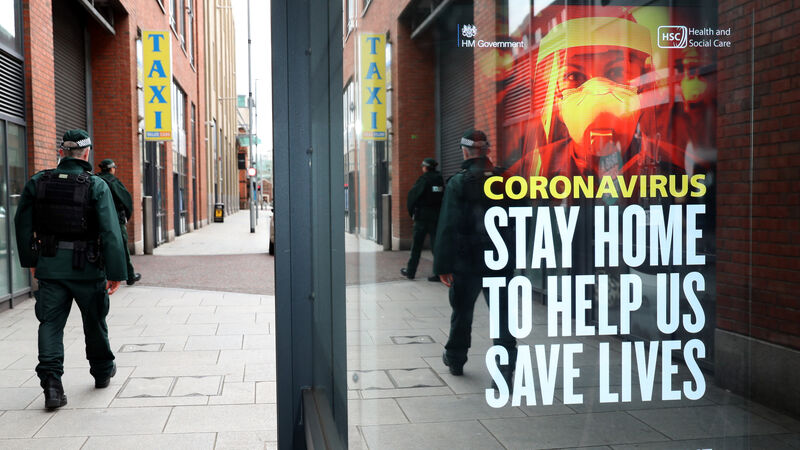Covid-19: 10 deaths and 511 new cases as NI enters lockdown extension

There were 49 Covid-19 patients in intensive care on Saturday morning.
The deaths of a further 10 people with Covid-19 were confirmed in Northern Ireland as the fallout from Stormont wrangling over pandemic restrictions continued.
The death toll recorded by the Department of Health rose to 846 on Saturday.
There were also another 511 confirmed cases of the virus recorded in the latest 24-hour reporting period.
The data from the department indicated that four hospitals in the region are over capacity – Antrim, Craigavon, South West Acute in Enniskillen, and the Ulster in Dundonald – while occupancy across the region’s hospitals stands at 98%.
There were 49 Covid-19 patients in intensive care on Saturday morning.
The latest figures were outlined on the first day of a week-long extension of the North’s circuit-break lockdown.
They were published as First Minister Arlene Foster apologised for the frustration created within the business community over the Executive’s 11th-hour decision not to reopen the hospitality sector as initially pledged.
Meanwhile, Deputy First Minister Michelle O’Neill branded as “appalling” the DUP’s use of its Executive veto to prevent a longer extension of the circuit-break.
Next Friday, a phased lifting of the restrictions will begin when close contact services such as hairdressing resume and cafes and coffee shops are allowed to reopen.
The following week, other parts of the hospitality sector will be allowed to start trading again.
That plan was agreed by a majority of Stormont ministers after a week of dispute and acrimony around the Executive table.
Sinn Féin voted against proposals backed by the DUP, Alliance and UUP, with the SDLP having abstained.
The DUP’s desire to reopen sections of the economy drew it into a bitter confrontation with the other four Executive parties, all of which supported health minister Robin Swann’s proposal to extend the circuit-break by two weeks.
The outcome of four days of wrangling was an amalgam position comprising a one-week extension of the circuit-break followed by a reopening of the hospitality sector on phased dates.
The DUP’s deployment of a contentious mechanism – the cross-community vote – to veto Mr Swann’s proposals has been the focus of much of the political fallout.
The divergent positions of Mrs Foster and Ms O’Neill were again exposed on Saturday in opinion pieces both leaders penned for the Belfast Telegraph.
Mrs Foster defended her party’s use of the cross-community vote, a mechanism that means a proposal can only be approved if a majority of unionists and a majority of nationalists back it.
“The delays and difficulties of this week were deeply regrettable,” she wrote.
“I am sorry for the fear and frustrations it caused, particularly to businesses wanting clarity on the next steps.
“However, the DUP believed it was essential to reach the right agreement, not a rushed agreement.
“Rolling over the current regulations for another week or two without a concrete plan for reopening would have been immensely damaging to the economy.”
She added: “I am disappointed but not surprised to hear some parties characterising the use of the three Minister rule (cross-community vote) as an abuse of power. The Belfast and St Andrew’s Agreements set out very clearly that its purpose isn’t confined to minority-based issues.
“Covid-19 decisions are some of the most significant and far-reaching any Minister in Northern Ireland will ever make.
“We make no apology for seeking to bring certainty to businesses and households in the run up to Christmas whilst also balancing the need to continue with restrictions for a further period.
“The agreement reached may be imperfect, but it will give hope to those who rely on overtime shifts at this time of year to help put presents under the Christmas tree.”
Ms O’Neill said her party’s position was guided by public health advice.
“That expert health advice from the Chief Medical Officer (Dr Michael McBride) this week could not have been more clear cut – any move away from a two-week extension of the interventions would result in ‘excess deaths’,” she wrote.
“Were that advice different, and had it supported the easing of restrictions, then that’s exactly where I would have gone. But it isn’t. It’s unequivocal, it is stark. Ease the restrictions, and that will result in more lives being lost.
“That is why Sinn Féin Ministers backed the Health Minister’s proposal to extend the restrictions for a further two weeks, and voted against any proposal asking for partial easing of the restrictions.
“I find it appalling that an instrument designed to protect minorities was used by the DUP to block public health measures – measures that would have helped support our health workers.
“They did so in the knowledge that we are facing into the reality that the situation with Covid is at its worst since June.”





